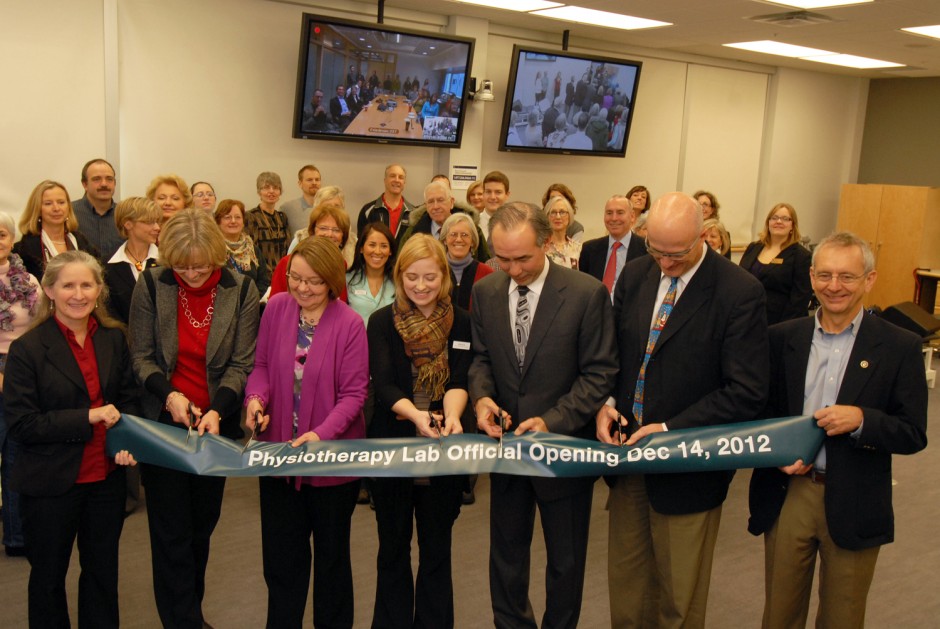A new physiotherapy teaching lab opened today in Prince George to support the new Northern and Rural Cohort of UBC’s Master of Physical Therapy program.

L-R: Jayne Garland, Head of UBC Department of Physical Therapy; Cathy Ulrich, CEO of Northern Health; Shirley Bond, MLA for Prince George-Valemount; Regan Daoust, Northern and Rural Physiotherapy Cohort student; UNBC President George Iwama; Pat Bell, MLA for Prince George-Mackenzie; and David Snadden, Executive Associate Dean, Education, UBC Faculty of Medicine.
The teaching lab, at the University of Northern British Columbia (UNBC), expands upon the nearly decade-long partnership between UBC’s Faculty of Medicine and UNBC that enabled the distribution of MD undergraduate education program to the northern part of the province.
The lab — equipped with four large video monitors, video cameras and a full complement of physiotherapy teaching equipment, including nine plinths (assessment and treatment tables) — will support UNBC’s role as the clinical hub for students in the Northern and Rural Cohort (NRC). The state-of-the-art lab is connected to the UBC Faculty of Medicine, allowing for distributed learning as well as local teaching.
“This lab represents our ongoing commitment to provide more clinical learning opportunities for physical therapy students in northern communities, as well as more professional development opportunities for therapists already practicing there,” said Gavin Stuart, Dean of the Faculty of Medicine and UBC’s Vice Provost Health. Now students and professionals will be able to connect through real-time, two-way video to students and instructors at UBC in Vancouver or one of the 20 other clinical sites throughout the province. This is a crucial step in ensuring that residents of northern B.C receive the same level of care as those in the rest of the province.”
Currently, only 7.4 per cent of B.C.’s physiotherapists work in rural and remote areas — the equivalent of 28 physiotherapists per 100,000 people in northern B.C. as compared with an average of 62 physiotherapists per 100,000 in the province as a whole. To achieve a more balanced distribution, the Ministry of Advanced Education funded the development of the NRC — 20 seats within the existing 80 seats of the Master’s of Physical Therapy program for clinical education in northern and rural communities.
Students are selected for the NRC from among the successful applicants to the Master’s of Physical Therapy program, based on GPA, interview scores and their rural background and suitability for rural practice. The first NRC was admitted in September 2012, and includes four students from northern B.C.
The NRC students, who are now pursuing coursework at UBC, are required to complete four of their six clinical education placements (a minimum of five months of the 26-month program) in northern and rural communities in BC. Their first northern/rural clinical placements will start in April, at Dawson Creek, Fort St. John, Prince George, Quesnel, Terrace, and Prince Rupert.
Since 2004, UNBC has served as the home of the Northern Medical Program, which educates 128 first- through fourth-year UBC medical students through a combination of local instruction, videoconferencing with other academic and clinical sites in B.C., and clinical placements in the region. UBC has two other distributed sites for MD undergraduates — the Island Medical Program (based at the University of Victoria) and the Southern Medical Program (based at UBC’s Okanagan campus).
“We recognize that health-care students who are educated in the North are more likely to stay and practice in the North,” said Pat Bell, MLA for Prince George-Mackenzie. “Physical therapy students who are part of the new clinical cohort now have the facility and tools they need to continue their studies here in the North. They will have the opportunity to pursue careers and contribute to the economy in the North, providing quality health care to northern and rural communities, keeping them vibrant and healthy. In addition, it is important to recognize the partnership between UNBC and UBC that allows physical therapy students to gain practical experience in northern and rural areas.”